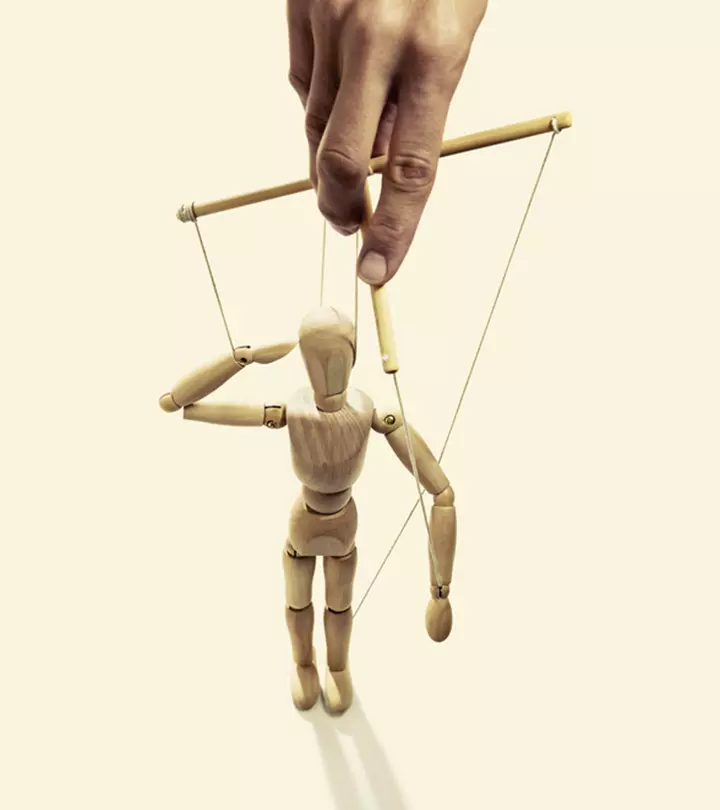9 Signs Of A Controlling Husband And How To Deal With It
In a marriage where your partner micromanages you, it's time to establish new boundaries.

Image: Shutterstock
Jealousy, control in a marriage are complicated subjects to understand. Here, in this article, we have made a list of signs of a controlling husband to make it easy for you to check if you have one.

Marriage brings a lot of changes into a woman’s life, and the best way to adapt to them is by embracing them by making a few adjustments to your life. But there are some things that you should not entertain, and you should nip them in the bud, like your husband’s controlling and manipulative behavior.
Controlling husband traits include domination, manipulation, and intimidation. They don’t honor your wishes and constantly dismiss your views, impacting your mental health and self-esteem. This sort of possessive, dominating, and authoritarian behavior carries more negative effects than you can imagine. It can seriously impact your confidence levels. In this article, we have listed some tips that can help you deal with your controlling husband. This article provides informational insights and offers advice on how to recognize and deal with controlling behavior in a relationship. Scroll down to know more.
In This Article
9 Signs Of A Controlling Husband

Before finding a solution, it is essential to diagnose if there really is trouble in your paradise and that it is not something trivial or momentary. Here are 9 signs of a controlling husband. If your partner exhibits more than 4 such behaviors, you need to take a step soon:
- He Constantly Criticizes You: This is one of the most obvious signs that your husband is trying to take control over you. He criticizes you at every step. It can begin with the simplest things, like how you do your work or dress up, and eventually worsen. It will not only put you down but also break your self-confidence gradually. It can also chip away at your self-worth, making you question yourself, feel insecure, and become more dependent on him.
- He Makes Your Feel Guilty: Oppressive and controlling people often make you feel guilty when you do not go according to their wishes. Moreover, they will try to manipulate you into doing things they like. They will also twist words and blow any argument out of proportion so that you end up being the bad person while they pose as the victim. For instance, if you decide to go out with your friends instead of spending time with him, he might say, “I can’t believe you are choosing them over me. I guess I am just not important enough to you”, making you feel like you have done something wrong even though it is a normal choice.
- He Gets Jealous, A Little Too Much: There is always some level of jealousy in all relationships, but when you have a controlling husband, it can go overboard. He will read too much into your conversations with other guys. It can end up with him becoming more obsessive and spying on you by checking your phone calls, emails, and so on. For instance, if you are talking to a male coworker, he might accuse you of flirting, asking, “Why are you spending so much time with him?” He may even check your phone to see if you are texting anyone.
- He Cuts Off Your Social Relations: A controlling husband wants to weaken your spirit and keep others from finding out and helping you deal with the toxic relationship. That is why he will try to cut your communication with others and isolate you. Just like criticism, isolating you will begin slowly and get worse over time. For instance, if you plan to meet your friends, he might say, “Why do you need to spend time with them? I am more important than them” eventually preventing you from hanging out with your close friends or family members. His possessiveness and jealousy will also play a role in this, leaving you unguarded and vulnerable. This restrictive behavior can affect you greatly and increase the feeling of loneliness. Remember that you have the right to choose your company and he should not prevent you from spending time with your close friends or family members.
- He Wants To Know Everything About You: From whom you are talking to on the phone to your financial status, your controlling husband would want to know every little detail. He may even start hijacking your decisions and controlling your actions directly or indirectly. For example, he might ask questions like, “Who were you talking to on the phone? What did you discuss? Why were you out late yesterday?” He may even decide how you should spend your money.
 Quick Tip
Quick Tip
- He Threatens You: Whenever there is a fight, he may threaten to leave you or take away your kids or reveal your secrets to your family. The threats can be of any magnitude, but it is a way of extreme emotional manipulation he tries to pull over you.
- He Gaslights You: Gaslighting is a technique where a person tries to manipulate your thoughts, making you question yourself. It is a form of emotional abuse that is often found in controlling people. They challenge your sanity and wear you down to such a state that you start doubting yourself and feel like you have to rely on them. It sets the stage for further manipulation and control. For example, if you recall a past event clearly, he might say, “That didn’t happen like you think. You must be imagining it. You’re overreacting.” This makes you doubt your memory and believe his version of events, even though you know something different occurred.
- He Ignores What You Say: If your husband wants to control you, he will ignore everything you say. Your words will fall on deaf ears, and this will again affect your self-confidence. He might even belittle you when he dismisses your opinions in front of others. For example, if you express your feelings, he might say, “I don’t care about your opinions,” or “Stop talking; I’m not listening.” This behavior dismisses your thoughts and feelings, making you feel unheard and unimportant.
 Quick Tip
Quick Tip- His Love Comes With Conditions: A controlling husband will shower you with love as long as you give in to his conditions. For instance, if you are busy at work, he will not show you any love or affection. But as soon as you start caring for him, he can be the best husband ever. So, you will have to work harder for his love every time, and that’s not how a healthy marriage works.
A controlling husband can impact one’s overall health and well-being. Find out more about it in the next section.
Key Takeaways
- A controlling husband will criticize you and break your self-confidence.
- Your husband’s jealousy, possessiveness, and gaslighting behavior can wreak havoc on your mental health.
- Setting clear boundaries, helping him get therapy, and building a strong support system for yourself can help you deal with a controlling husband.
Effects Of Having A Controlling Husband
Living with a controlling husband can negatively impact a person’s emotional, mental, and physical well-being in the following ways.
- The constant monitoring and control can lead to heightened levels of anxiety and stress.
- You may experience social isolation if your controlling partner tries to limit your interactions with your friends and relatives.
- Being told what to do and how to behave all the time may damage one’s sense of value and confidence.
- The chronic stress and anxiety that may develop due to this may lead to physical issues such as headaches and digestive problems. Feelings of inadequacy may lead to long-term self-esteem issues and psychological disorders.
Marriage to a controlling husband can be tricky to navigate. The constant criticism, manipulation, and emotional abuse impact your mental health. A study conducted on Nigerian women reveals just how controlling behavior can escalate to physical and sexual violence within relationships. Women who reported controlling behavior by their husbands were found to be at significantly higher risk of experiencing both forms of violence. The study emphasizes how controlling behavior leads to emotional and psychological harm, but also as a potential precursor to physical harm (1).
So, before things become worse, it is best to take steps. Head to the next section to know how you can tackle these manipulation techniques aimed at asserting dominance over you.
How To Deal With A Controlling Husband

Here are a few tips on how to cope with a controlling husband:
- Stay Calm: A controlling husband can be quite irritating, but you need to calm down. Be the bigger person and ask them gently about issues. It may look like you are surrendering to him, but you are just trying to blow down the fire. This reverse psychology may help you and turn things in your favor.
- Establish Clear Communication: Honesty is vital in any relationship, especially when it comes to expressing your feelings or criticisms. Do not shy away from sharing your needs or concerns with your partner. Having open conversations can lead to better understanding and may encourage your partner to reflect on their behavior.
- Take Control Of Your Life: Stop feeling guilty and weak if your controlling husband wears you down. Instead, take charge of your life and appreciate yourself. It will strengthen your confidence, and you can control things better. Try taking up a new hobby and spend time doing the things you like.
- Figure Out The Reason For The Behavior: Try to trace the events that led to this behavior. It could be anything – from a traumatic childhood to the death of a loved one. He may also have some mental health issues like anxiety or bipolar disorder. Once you know the reason, you may be able to help him. Remember, love can heal the deepest wounds.
- Keep A Strong Support System: Being alone never helps, especially when you have a controlling husband. So, keep your friends and family close to you. Make plans with them and share your troubles. Don’t let your husband isolate you.
- Set Boundaries: This step is helpful when your husband wants to know everything about you. Tell him about your limits and the consequences of any violation so that he understands how serious you are about the boundaries. It is time-taking yet worth it.
- Try Therapy: If nothing works, you can always go to a professional therapist to sort the marital issues. This way, you both will get the chance to speak your side of the story and find answers to what is causing this behavior.

- Ask For Help: People often hesitate to ask for help when it comes to marriage. Avoid this mistake if you have a controlling husband who torments you mentally, verbally, and physically. Do not wait for things to escalate to physical abuse. Instead, speak up and let your friends know.
When things get out of hand, and you feel unsafe and unheard in the marriage, it is time to call it quits. After all, nothing is more important than your mental health and happiness. Scroll down to know ways to exit the relationship safely.
Getting Out Of A Controlling Relationship

A healthy marriage is based on love, respect, and care. If you feel that your controlling husband’s behavior has jeopardized all these things and you just cannot take it anymore, it is the right time to walk out of the relationship.
You can go for a divorce. But before that, make sure you have a strong backup. Assemble your support system, think about finances, and if you have kids, think about custody as well.
Another way is to seek professional help from a lawyer or marriage counselor. They will find out the right steps for you to get out of the toxic marriage. Leaving a relationship is difficult but if it is taking the life out of you, choose yourself.
Infographic: Top 5 Signs Your Husband Is Controlling
It is expected and natural to make adjustments after your marriage. But if your husband starts acting differently, you should deal with it at the beginning to avoid more problems in the future. Your husband’s authoritarian behavior should be a cause for alarm. If you are still wondering whether he is controlling or not, check out the infographic below for the top signs to look out for.
Some thing wrong with infographic shortcode. please verify shortcode syntaxA controlling husband is not only particular about your whereabouts, whom you meet, and how you spend every single minute but may also turn out to be aggressive or abusive. Excessive possessiveness, inquiring about every tiny detail, micromanaging, and offering to schedule your day in spite of your will may be signs of a controlling husband. As much as it is important to know when and how you connect with a person, it is also important to be aware of toxic relationship signs. You need to pay attention to their domineering attitude and dictatorial traits that can pose a threat to you both mentally and physically. Minimum respect, care, and trust are important to keep a relationship going. If you find yourself feeling alone, left out, disrespected, or abused in any way, it is important to identify the toxic traits and take a stand for yourself rather than continuing the suffocating relationship.
Frequently Asked Questions
What is the difference between caring and controlling?
Sometimes, people confuse controlling behavior with care. That’s why they slowly find themselves stuck with a controlling partner. So, it is important to know the difference between the two and correctly identify the signs of a control freak.
Here is a list of distinctions between caring and controlling behavior in various scenarios:
1. RulesCaring:
When you both create rules to make your relationship successful.
Controlling: When the rules he ‘creates’ apply only to you.
2. Meeting Friends
Caring: He offers you a ride when you go to meet your friends and even joins you at times.
Controlling: He meets his friends and family but stops you from doing the same.
3. Calls And Messages
Caring: He drops a sweet message occasionally to know how you have been doing and says he misses you.
Controlling: He calls you all day to know where you have been and who you have been with.
4. Compliments
Caring: He boasts about your career in front of his friends and family.
Controlling: He talks about your job in a condescending way.
5. Social Media
Caring: He comments on your pictures, saying how you look hot and beautiful.
Controlling: He checks your social media and controls what you post and comment.
6. Fights
Caring: There will be fights, but they don’t stay for long. Both of you end up apologizing and understanding.
Controlling: He blames you every time and makes you feel guilty.
Frequently Asked Questions
Why is my husband so controlling?
There are various reasons behind a man’s controlling behavior, not the least of which is a lack of awareness about what a healthy marital relation should be like. Other factors include substance abuse, financial or emotional insecurities, and personality or mental health disorders. Some men also tend to be naturally chauvinistic, making them more controlling in their nature.
Will a controlling man ever change?
It may be possible for a controlling man to change with therapy, clear boundary setting, and honest communication.
Is being controlling abusive?
Yes, being controlling can be considered to be emotionally and sometimes physically abusive, depending on the extent to which the control is exerted. Some signs your partner is controlling you are when they keep you isolated, disregard your opinion, are paranoid, and guilt-trip you into feeling like you are wrong.
How do you fix a controlling relationship?
Setting boundaries, communicating, and going for therapy or marital counselling are the most important ways to help fix a controlling relationship.
Illustration: Signs Of A Controlling Husband And How To Deal With It

Image: Dall·E/StyleCraze Design Team
Identify the signs of a controlling spouse or husband. Learn how to recognize red flags and take steps towards a healthier relationship from the video below.
References
Articles on StyleCraze are backed by verified information from peer-reviewed and academic research papers, reputed organizations, research institutions, and medical associations to ensure accuracy and relevance. Read our editorial policy to learn more.
Read full bio of Dr. Holly Schiff
Read full bio of Sneha Tete
Read full bio of Shatabdi Bhattacharya
Read full bio of Gracia Odile



























Community Experiences
Join the conversation and become a part of our empowering community! Share your stories, experiences, and insights to connect with other beauty, lifestyle, and health enthusiasts.